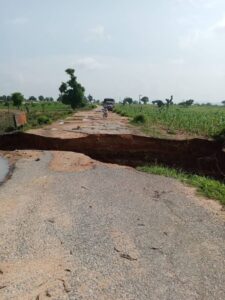Record floods on the Western Cameroonian border with Nigeria have killed six people, washed away homes and destroyed thousands of tons of food that was initially meant for export, say the Cameroonian authorities.
The officials of the Widium council have been circulating a video wherein civilians are seen asking the Cameroon government to help clear the roads of earth, mud and stones so that they are able to leave Widikum.
Among the merchants asking for help is Paul Okafor, a Nigerian who buys palm oil and vegetables from Widikum and goes on to sell them in his country. According to Okafor, he has been stuck in Widikum for five days because of floods and landslides, and no vehicle has been able to leave or enter because flood waters have covered roads and landslides have blocked roadsides.
The merchant conveyed that the vegetables and tomatoes he bought are beginning to rot. Widikum vegetable farmers are also complaining that their harvest is decaying.
The mayor of Widikum district, Andoh Stanilos, acknowledged that his council staff had shared the videos. He stated that the floods that triggered landslides have killed six people, left hundreds homeless, and destroyed homes and warehouses across the district.
“As I speak, there are over 55 people who are without something to eat. The council is trying to mobilize resources, so I send this SOS to the government and people of goodwill to come forward and aid those who are destitute now.” said the Mayor.

The floods have destroyed a 36-meter-long bridge on the River Momo, which resulted in hundreds of merchants and commuters getting stranded on both sides of the river. Momo is a production basin for palm oil, maize, potato, tomatoes and vegetables.
Last month, Cameroon’s National Observatory on Climate Change predicted that floods and landslides would hit many Cameroonian towns and villages. The district Widikum was also a part of the forecast.
Forghab Patrick, deputy director general of the observatory, said homes that are built in flood-risk areas had aggravated the situation.
“People build in marshy areas,” Patrick said. “What happens? Water cannot circulate correctly because the houses block the waterways, and those living in those homes are exposed at the end of the day.”
The government said they are educating people to stop settling on risk zones, but there is no confirmation on whether or not the government will provide the food and water being asked for by hungry victims.
